King’s College Cambridge has long been the epicenter of groundbreaking scientific discoveries and celebrated intellectual legacies. Iconic figures like Stephen Hawking, Charles Darwin, and Isaac Newton once walked these historic halls, leaving an indelible mark on our understanding of the universe, evolution, and mathematics. While the college’s renowned traditions and secretive customs have captivated the world, there’s far more to uncover about the inner workings and hidden stories that have shaped this prestigious institution over the centuries. Delving deeper into King’s College’s storied past reveals a tapestry of innovations, mysteries, and the remarkable individuals who’ve left an enduring impact on our world.
Key Points
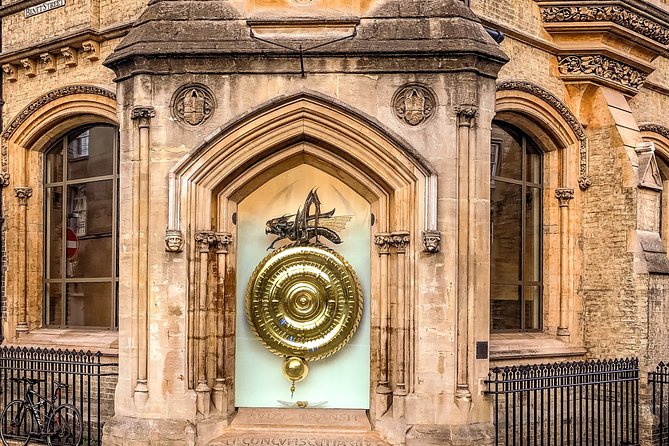
- King’s College Cambridge has a rich history of pioneering innovations, including groundbreaking work by renowned figures like Charles Darwin, Isaac Newton, and Stephen Hawking.
- Cambridge’s graduation ceremonies and traditions, such as the ceremonial throwing of caps, reflect the university’s prestigious heritage and academic milestones.
- The Corpus Clock, designed by inventor John Taylor, features a mesmerizing mechanism and cryptic symbolism that represent Cambridge’s scholarly ingenuity.
- The University Boat Race between Cambridge and Oxford is one of the oldest intercollegiate sporting events, showcasing the energy and excitement of Cambridge’s heritage.
- Pembroke College, founded in 1347, offers insights into Cambridge’s intellectual and cultural history through its historic buildings and notable alumni like philosopher William Paley.
Famous Inventions and Discoveries
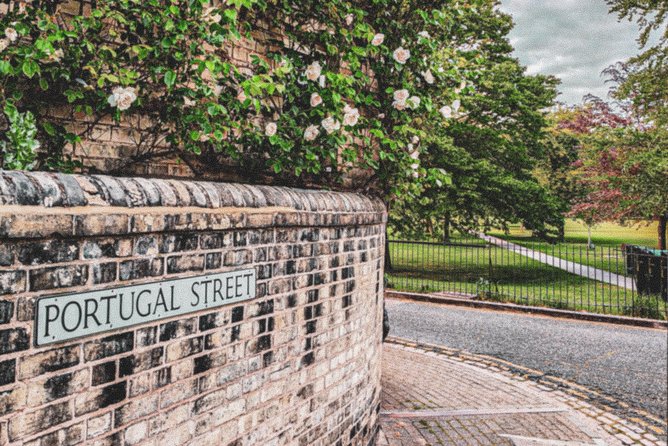
Several famous inventions and scientific breakthroughs originated from King’s College Cambridge. This prestigious institution has been a hub of innovation for centuries.
Notable figures like Charles Darwin and Isaac Newton made groundbreaking discoveries while studying or teaching at the college.
Even renowned physicist Stephen Hawking, who was a fellow at King’s, developed his revolutionary theories on black holes and the origins of the universe.
The college’s rich history is intertwined with numerous pioneering ideas that have shaped our understanding of the world.
From advances in mathematics to breakthroughs in biology, King’s College Cambridge has been at the forefront of scientific progress for generations.
You can also read our reviews of more tours and experiences in Cambridge.
Graduation Ceremonies and Traditions

At King’s College Cambridge, the time-honored tradition of graduation ceremonies holds a special place. During these celebrations, graduands don the iconic Cambridge gown and mortar board, signifying their academic achievements.
The ceremony is steeped in centuries-old rituals, from the formal procession to the conferring of degrees by the Chancellor. Graduates take part in the ceremonial throwing of their caps, a jubilant moment marking the completion of their studies.
This time-honored tradition not only recognizes individual accomplishments but also reinforces the rich heritage and prestige of the University. The pomp and circumstance of King’s College graduations exemplify the profound significance of these milestones in the lives of its students.
Corpus Clock and Its Mysteries
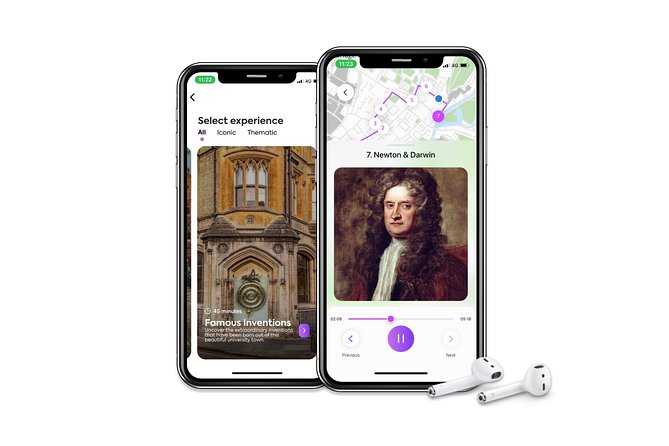
One of the most captivating features on the King’s College Cambridge campus is the enigmatic Corpus Clock.
Designed by inventor and horologist John Taylor, this fascinating timepiece is adorned with a grotesque figure that devours the minutes as they pass.
The clock’s mesmerizing mechanism and intricate details have captured the imagination of visitors for over a decade.
Beyond its striking appearance, the Corpus Clock conceals deeper mysteries – its cryptic symbolism, the significance of its position on Corpus Christi College, and the enduring legacy of its creator.
This unique landmark offers a glimpse into Cambridge’s rich history and the ingenuity of its scholars.
University Boat Race Traditions
King’s College Cambridge’s storied history extends far beyond the captivating Corpus Clock.
One of the college’s most beloved traditions is the annual University Boat Race. This iconic event pits Cambridge against Oxford in a fierce rowing competition on the River Thames.
Thousands gather to cheer on the rowers, who represent the culmination of months of intense training. The race has taken place since 1829, cementing its status as one of the world’s oldest intercollegiate sporting events.
The sheer energy and excitement of the day make it a must-see for any visitor to Cambridge. Whether you root for the Light Blues or the Dark Blues, the University Boat Race is a true highlight of the college’s rich heritage.
Exploring Pembroke College’s History
Beside the iconic King’s College, Pembroke College stands as another jewel in Cambridge’s crown, boasting a storied history that spans over 700 years. Founded in 1347, the college has nurtured numerous luminaries, including the renowned philosopher and theologian William Paley.
The college’s historic buildings, including the breathtaking Chapel, showcase the finest examples of Gothic architecture. Visitors can explore the tranquil courtyards, admire the masterful craftsmanship of the college’s façade, and uncover the secrets hidden within Pembroke’s hallowed halls.
From its distinguished alumni to its architectural marvels, Pembroke College offers a captivating glimpse into Cambridge’s rich intellectual and cultural heritage.
Insights Into Cambridge’s Renowned Alumni
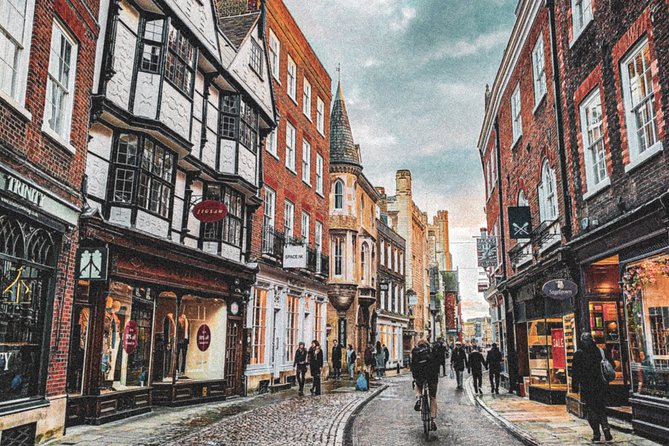
Cambridge University has consistently produced a remarkable cohort of renowned alumni who’ve made indelible marks across various fields.
From the groundbreaking scientific discoveries of Charles Darwin and Stephen Hawking to the mathematical genius of Isaac Newton, the university has nurtured some of the most influential minds in history.
These luminaries haven’t only advanced human knowledge but also inspired generations of scholars and innovators. Their legacies continue to shape the intellectual landscape, serving as a testament to the transformative power of education and the pursuit of knowledge.
Exploring the lives and contributions of Cambridge’s illustrious alumni offers invaluable insights into the university’s enduring legacy of excellence.
Accessibility and Transportation Options
The self-guided audio tour of King’s College Cambridge is designed to be accessible and convenient for visitors.
Wheelchair and stroller users can easily navigate the tour, as the route is wheelchair and stroller accessible. Plus, the tour is located near public transportation options, making it easily accessible for those relying on buses or trains.
The tour is also available daily from 7:00 AM to 9:00 PM, ensuring flexibility for visitors to explore at their own pace.
With these accessibility features and transportation options, the self-guided tour provides an inclusive and convenient way for all to discover the secrets of King’s College Cambridge.
Exploring the Self-Guided Audio Tour
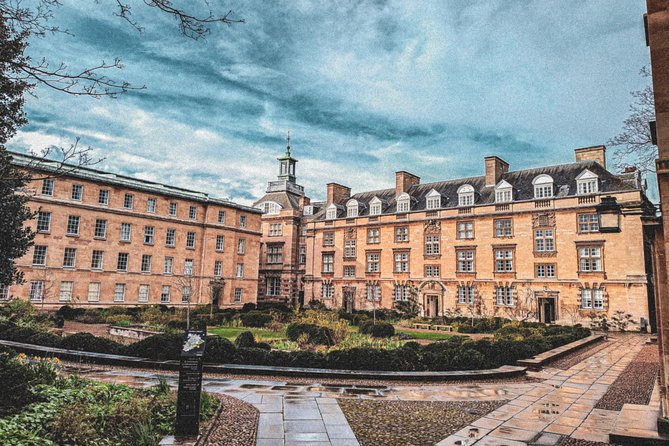
Embarking on the self-guided audio tour of King’s College Cambridge, visitors are immersed in an enriching exploration of the university’s storied past. Equipped with GPS-enabled mobile devices, they navigate the city’s winding streets, discovering famous inventions, scientific breakthroughs, and unusual traditions.
The audio guides, narrated by local historians, provide a captivating commentary, bringing to life the stories behind the Corpus Clock, the University Boat Race, and the unique graduation ceremony.
As they stroll at their own pace, visitors gain a deeper understanding of Cambridge’s renowned alumni, including luminaries like Darwin and Turing.
The flexible, self-guided nature of the tour allows for a COVID-safe and independent learning experience.
Frequently Asked Questions
What Is the Cost of the Self-Guided Audio Tour?
The self-guided audio tour’s cost is not directly specified in the knowledge provided. However, the tour offers various features like an offline mode and mobile device access, suggesting it may have a fee but the exact pricing is unclear.
Can I Customize the Tour to Focus on Specific Areas of Interest?
The self-guided audio tour allows travelers to explore Cambridge at their own pace and customize their experience. Users can focus on specific areas of interest using the GPS-enabled app and downloadable audio content.
Is There an Option to Have a Live Guided Tour Instead?
No, this tour does not offer a live guided option. It’s a self-guided audio tour that allows you to explore at your own pace using a GPS-enabled app. The tour features recorded commentary from local historians.
How Long Does It Typically Take to Complete the Full Tour?
The self-guided audio tour is flexible, allowing visitors to explore at their own pace. Most travelers complete the full tour in 2-3 hours, but the duration can vary depending on one’s interests and the time spent at each location.
Are There Any Discounts Available for Students or Seniors?
The tour does not offer any specific discounts for students or seniors. However, the self-guided nature of the tour allows visitors to explore at their own pace, which can make it more accessible and affordable for those on a tighter budget.
Recap
King’s College Cambridge’s legacy of intellectual brilliance lives on, inspiring future generations to push the boundaries of human knowledge. From Hawking’s groundbreaking theories on black holes to Darwin’s insights into natural selection and Newton’s fundamental laws of motion, the college’s commitment to scholarly excellence has transformed our understanding of the universe. As a hub of innovation and innovation, King’s College continues to captivate and enlighten the global community.
More Tour Reviews in Cambridge
- Illustrious Schools: Group Tour of MIT And Harvard
- Departure by Luxury Van From Cambridge City to London Airport LHR
- LEGO® Discovery Center Boston Admission Ticket
- Hotel Collection Tour (Up to 5 Persons)
- Private Cambridge University Punting Tour
- Cambridge Tour App, Hidden Gems Game and Big Britain Quiz (1 Day Pass) UK
Not for you? Here's more things to do in Cambridge we have recnetly reviewed
- 3 Best Food Tours In Cambridge
- Bostons Original Dumpling Party // Cambridge
- Cambridge Outdoor Escape Game: Mission Truth
- Private Departure From Cambridge to Heathrow Airport LHR by Sedan
- Co2-Offset| Departure by Sedan From Cambridge City to CBG Airport
- Harvard University Scavenger Hunt and Escape Game
- Harvards Haunts Solo Smart Phone Guided App Ghost Walking Tour
- Unique Scavenger Hunt in Cambridge by Zombie Scavengers
- Cambridge LGBTQ+ History Walking Tour
- London to Duxford Imperialwarmuseum, Fun History Culture Memories
- Explore Cambridge With Family – Walking Tour
- CO2-Offset | Arrival CBG Airport to Cambridge by Luxury Vehicule
